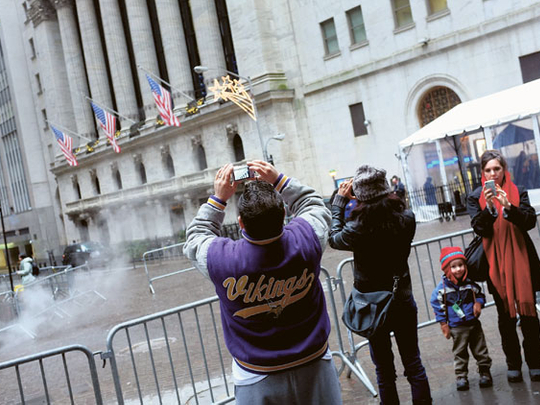
New York : Shaky Europe. Political gridlock. Volatile markets.
Familiar themes for those who lived through 2011, and investors should be ready to revisit them next year.
With a spiralling debt crisis in Europe, political upheaval around the world, and crumbling creditworthiness in major industrial nations, 2011 was a tough year to know where to invest. 2012 is unlikely to offer much respite.
The S&P 500, a measure of the biggest US companies' market value, spent much of the year getting pushed up and down, flummoxing shorts and longs — and scaring people away from stocks. It ended 2011 at 1,257.60, down 0.04 of a point.
But the S&P 500's tepid performance was encouraging, compared with other world equity markets. The United States may still be seen as a safe haven, though even that looks uncertain.
For every rally built on improving economic figures last year, sell-offs were never far away on worries the European debt crisis would eventually drag the continent into a recession and perhaps the United States as well. That could continue in 2012.
China and other fast-growing emerging markets can no longer be leaned on as those economies slow. In 2011's last half, the poorest-performing sectors outside of banks were most connected to global growth — materials, energy and industrial companies.
"There is a growing realisation that the global economy is in jeopardy," said Bruce Bittles, chief investment strategist at Robert W. Baird and Co in Nashville. "There is uncertainty in every corner of the world."
Substantial volatility
That uncertainty fed substantial volatility in 2011. Despite the S&P's flat performance this year, there were 66 trading days when stocks moved in a 2 per cent range. In 2008, when Lehman Brothers collapsed during a global financial crisis, there were more than 130 trading days when stocks swung that much. But that led to a flight from equities by retail investors.
US equity funds had outflows in every month since May. More than $483 billion (Dh1.8 trillion) left US mutual funds in 2011 through the year's second-to-last week, even though the US market outperformed foreign stocks late in the game. The S&P 500 ended the year off a scant 0.003 per cent, the closest it has come to unchanged since 1947, according to Standard and Poor's.
The Dow Jones industrial average finished 2011 with a 5.5 per cent gain, while the Nasdaq Composite Index slipped 1.8 per cent.
In contrast, the MSCI world stocks index fell 9 per cent, while the FTSEurofirst-300 index slid nearly 11 per cent.
The darlings in the emerging markets fared the worst. China's Shanghai Composite index lost 22 per cent, India's BSE sank 25 per cent, and Brazil's Bovespa dropped 18 per cent.
Strategists say the US stock market may benefit from reasonable economic growth and attractive market valuation. The S&P 500 is expected to rise 6 per cent by the end of 2012, according to the most recent poll of Wall Street strategists.
When Wall Street gets back to work on Tuesday, it will face a holiday-shortened week and a slew of economic indicators. The US stock market will be closed tomorrow in observance of New Year's Day. The most crucial numbers will come on Friday with the release of the government's non-farm payrolls report. Economists polled by Reuters expect a Dec-ember gain of 150,000 jobs, compared with an increase of 120,000 jobs in November.
Instability to persist
Volatility is likely to persist through early 2012 because of the uncertainty in Europe and rising concern about slowed earnings growth due to recent revisions.
The S&P 500's price-to-earnings ratio — what investors are willing to pay for a dollar of earnings — is under 12, below the 25-year average of 15. In weaker markets like Germany's DAX, the figure is below 9.
"We're building in a massive recession into these numbers," said Marc Pado, US market strategist at Cantor Fitzgerald and Co in San Francisco.
US companies cutting earnings' outlooks recently outpaced those raising theirs by the greatest ratio in ten years. Some sectors, such as materials, have seen a sharp drop in forecasts for the fourth quarter, Thomson Reuters data showed.
Last week, downbeat earnings from Oracle Corp shook confidence in the tech sector's health before the quarterly earnings season's start in January. Oracle joined a growing list of companies, including some of technology's biggest names, whose results and outlooks have set off alarm bells.












